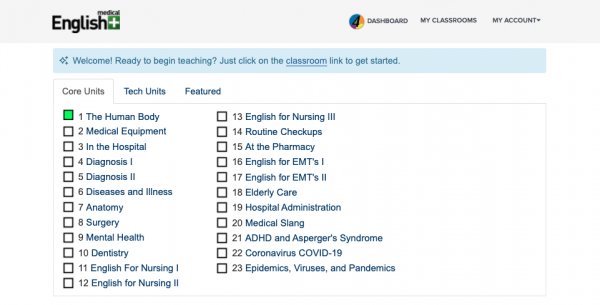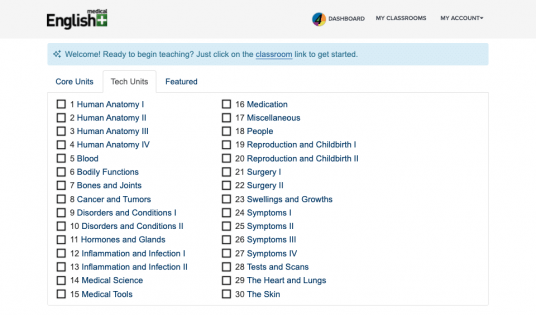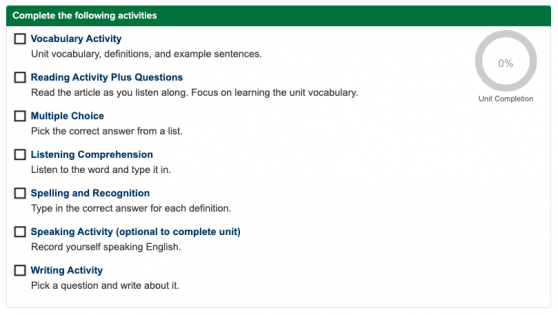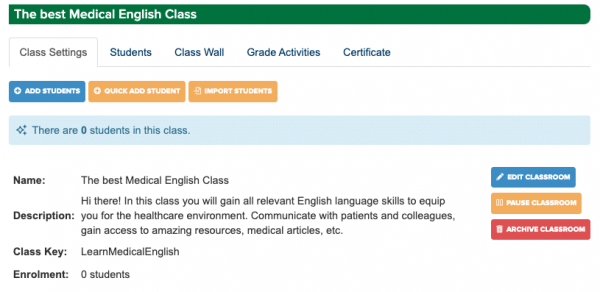Grey’s Anatomy is a great teacher of medical terms, but students who are serious about being able to practice medicine and healthcare in English
will need more.
Devising a course to specifically teach medical terms in a way that is engaging for students, supports their learning, and is full of high-quality
resources, can seem like a daunting task. That’s where English4Work’s MedicalEnglish comes in.
We have compiled the most important medical terms for hospitals, doctor’s offices, dentists, and anything medicine, and we make sure your students
know them. Not only today, but also tomorrow.
Table of Contents [hide]
What is Medical English?
The healthcare sector is fast-paced, and mistakes are high-risk. Medical professionals need to be steady, the more certainty the better. Communication is key. In today’s world, the English language has become inevitable, regardless of your speciality. But to work in healthcare requires not just general English skills, but familiarity with specific medical terms in English. These kinds of language skills are not taught in school, and – save for a few exceptions – not at medical school either.
What makes Medical English so particular, is that it’s not just technical terms. Medical professionals need more than that to function in the field. Instead, it’s a mixture of technical terms, academic language, and everyday words that will frequently be encountered at work. There’s tons of acronyms and slang that have nothing to do with general English skills.
Medical professionals and students with an advanced level of English skills have significantly more access to medical resources. Important research, academic papers, and continued education is oftentimes only accessible in English, providing English speakers with a significant advantage. Today, being familiar with medical terms in English is nothing short of a necessity.

What’s the problem?
Medical English education is tremendously overlooked and underrated. Many EMP (English for Medical Purposes) teachers are not well equipped when
it comes to teaching medical terms. Most teachers do not have a background in medicine, and teachers of medicine are often not English teachers.
Those who do take up the mantle of teaching EMP are often professionals with other primary occupations. Inevitably, they are under a lot of stress
devising lessons, due to lack of time.
Sourcing appropriate, quality teaching materials for Medical English is a difficult feat.
As medicine is an incredibly broad field, so is medicine in English. The number of medical terms and general medical vocabulary is immense. Additionally, there is the difficulty of teaching online, specifically for Medical English. Not much infrastructure exists to support teachers of English for Healthcare.
Time is of the essence for both teachers and learners!
Because doctors, nurses, and medical students have very little spare time, options for learning medical English become more limited. They are less likely to join medical English language courses if they are held in a synchronous way. Meeting face-to-face with teachers and tutors is difficult. Self-study on the other hand is also not an attractive alternative to most, as it requires a lot of research, preparation, and discipline. There aren’t sufficient learning materials for students to study with minimum effort while still making substantial progress. Many interested in learning English medical terms simply do not have the time or energy for self-studying.
Teachers need to acknowledge these shortcomings in English language education and provide appropriate solutions.

The solution to learning medical terms
MedicalEnglish is designed to teach English for Healthcare as it is spoken and written across the globe – in hospitals, doctor offices, EMT (Emergency Medical Technician) operations, etc. Our focus lies on conveying industry-specific, relevant medical terms, rather than teaching general English vocabulary. We therefore recommend an intermediate knowledge of the English language at the minimum (B1 or higher on the CEFR scale).
How are units structured?
The content for our MedicalEnglish module was written by Medicine and Healthcare professionals and edited by certified EFL instructors.
Content units range from ‘The Human Body’ to ‘Epidemics, Viruses, and Pandemics’, covering all relevant medical terms needed to operate in the
healthcare environment. Currently, MedicalEnglish includes 1061 medical English terms – over 53 units.
Each unit introduces a vocabulary sheet with approximately 20 medical terms that students need to know. For each term, a definition is given to explain its meaning. Additionally, an example sentence emphasizes the meaning, and shows students how this vocabulary word may be used. In order for students to be sure of proper pronunciation, they can listen to the medical terms as well as the example sentences in both British English and American English accents. Vocabulary sheets can also be downloaded in the form of a medical terms PDF file, so students can practice their words even when they are offline.

Another important feature is also our medical terms dictionary, containing all 1061 medical English terms. If students are looking for a specific vocabulary word, they can find it here and look up the precise medical terms and meaning.

Core & Tech Units
Our Medical English units are split into 23 Core Units and 30 Tech Units.
The main difference is that Core units include 7 different activities (Vocabulary, Reading, Multiple Choice, Listening Comprehension, Spelling and
Recognition, Speaking, and Writing), while Tech Units only include 5 activities (Vocabulary, Reading, Multiple Choice, Listening Comprehension,
and Spelling and Recognition). Tech Units serve as an extra vocabulary building section, which students can complete 100% independently. Many of
our teachers therefore choose to have students work on Tech Units for homework.

BONUS: Featured Units
As a little ‘candy’ our Featured Units give you access to content from 5 different content modules:
English4InfoTech,
MedicalEnglish,
English4Accounting,
English4Hotels, and
English4Office.
Many students are curious to catch a glimpse into other ESP (English for Specific Purposes) modules. And it may also be interesting for you as the
teacher. 😉

Focus on thinking and comprehension
With English4Work’s MedicalEnglish module, you are able to easily mass-train hospital or private praxis staff, teach English for medical students. With our proven methods to increase content retention, learning is fun and effortless. Because of our focus on comprehension, students learn to genuinely understand each vocabulary word, as well as how to use it.
With 7 different activities, rooted in the 4 pillars of language learning, we ensure that students gain a well-rounded understanding of the medical terms and meaning.

Disburden teachers
English4Work addresses the problem of EMP teachers’ lack of time and resources by providing a
ready-to-go general Medical English course. We provide a simple yet effective way for students to learn the most common medical
terms. With the help of English4Work’s MedicalEnglish module, the weight of gathering appropriate teaching materials and devising lessons is
lifted off of teachers’ shoulders.
Instead, they are able to concentrate on put their efforts where it most benefits their students. They can practice the learned Medical English
skills in the classroom, or elaborate on English4Work content with more area-specific vocabulary, assured that the students’ general English
medical vocabulary is being cultivated by English4Work.
Using classroom settings, teachers are able to control how students will engage in the course. Independently as a self-study vocabulary builder? Teacher-centric and engaging in a class community? With or without Speaking and Writing activities? It’s up to you.

Monitor progress together
The best thing is that both students and teachers can check how the learning process is going, real-time as it’s happening. Our system instantly grades all completed activities, except for Writing and Speaking activities. These must be graded by the teacher, in order for students to receive their certificate. Instant feedback is especially valuable to those Medical English learners who do not have an abundance of time, and need to get their studying in whenever they can. Feedback is vital to learning success, and on the English4Work platform, there is no shortage of feedback for students.
Doctors, nurses, medical students, dentists, physiotherapists, radiographers, etc., universities with a healthcare department, individual EMP teachers: This is for you.

Interested in being a world-class Medical English educator too?
Get your license or try our
free DEMO first, and see what English4Work can do for you!

